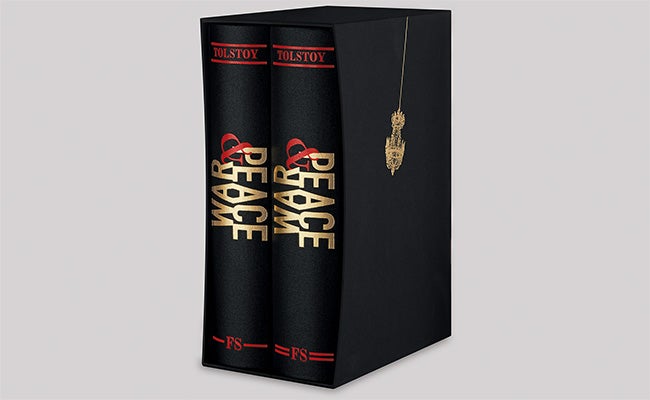Library Stories | James Howland Beers
In Library Stories we investigate the tales behind your book collections and book rooms, visiting the homes of Folio members, collectors and enthusiasts from around the world. If you have a Library Story you would like to share, please email us at social@foliosociety.com.
This month we speak with long-time US member James Howland Beers about Napoleonic busts, the inadequacies of modern bookshelves and reading War and Peace on Borodino field.
 FS: You have a beautiful library, could you tell us a little about its history? When did you first start collecting books?
JHB: I grew up in a home that had books in virtually every room. My father was a Protestant minister and even though he never had a very grand salary, he joined a now extinct American limited edition club in the 1940s and bought as many books over the years as he could afford. As a result, by the time I came along, there were fine books in every bookcase. As a child, the bindings and, even more so, the illustrations fascinated me.
While I also received my share of Britains toy soldiers and electric trains while growing up, every gift-giving time in my family really meant that we’d be exchanging books, usually on historical subjects, Brit Lit or fine art.
By the time I was in college, Dad had discovered The Folio Society and I finally learned that it was one thing for a book to have a handsome look and quite another for it to be both handsome and exceedingly well made.
FS: You have a beautiful library, could you tell us a little about its history? When did you first start collecting books?
JHB: I grew up in a home that had books in virtually every room. My father was a Protestant minister and even though he never had a very grand salary, he joined a now extinct American limited edition club in the 1940s and bought as many books over the years as he could afford. As a result, by the time I came along, there were fine books in every bookcase. As a child, the bindings and, even more so, the illustrations fascinated me.
While I also received my share of Britains toy soldiers and electric trains while growing up, every gift-giving time in my family really meant that we’d be exchanging books, usually on historical subjects, Brit Lit or fine art.
By the time I was in college, Dad had discovered The Folio Society and I finally learned that it was one thing for a book to have a handsome look and quite another for it to be both handsome and exceedingly well made.
 FS: From your photos and correspondence, it is obvious that books play a central role in both your home and your life. Indeed, you mentioned that they are ‘in essence, my family’. Can you speak a little more about this?
JHB: I look upon my books as my extended family. I’ve moved almost twenty-five times in my life; by the time I was in college, I’d moved six times. Very early on, I came to feel that my books and bookcases were the one constant factor in my life. They were my best friends. I am embarrassed to admit that I have driven the occasional wife quite crazy by insisting on unpacking and shelving my library first before doing anything at all to help create a functional kitchen …
FS: You have been a member for quite a number of years. Do you have a favourite Folio edition? How and when did you first come across Folio?
JHB: It’s hard to say which of my books I like the most. Since I have always had an affinity for busy-ness and clutter, I suppose I’m fondest of Folio’s Roman Legion books by Rosemary Sutcliff. Their intense, ‘Victorian’ covers are splendid. If there’s room in my coffin, however, I may ask to have my slipcased Folio Society Kelmscott Chaucer buried with me. It is probably the book I value the very most.
FS: From your photos and correspondence, it is obvious that books play a central role in both your home and your life. Indeed, you mentioned that they are ‘in essence, my family’. Can you speak a little more about this?
JHB: I look upon my books as my extended family. I’ve moved almost twenty-five times in my life; by the time I was in college, I’d moved six times. Very early on, I came to feel that my books and bookcases were the one constant factor in my life. They were my best friends. I am embarrassed to admit that I have driven the occasional wife quite crazy by insisting on unpacking and shelving my library first before doing anything at all to help create a functional kitchen …
FS: You have been a member for quite a number of years. Do you have a favourite Folio edition? How and when did you first come across Folio?
JHB: It’s hard to say which of my books I like the most. Since I have always had an affinity for busy-ness and clutter, I suppose I’m fondest of Folio’s Roman Legion books by Rosemary Sutcliff. Their intense, ‘Victorian’ covers are splendid. If there’s room in my coffin, however, I may ask to have my slipcased Folio Society Kelmscott Chaucer buried with me. It is probably the book I value the very most.
 FS: You obviously have a keen interest in military history. If you don’t mind, talk to us a little about your background and how this passion developed, and maybe give us a quick tour of your impressive collection of military objects? (I particularly like the Napoleonic figures trudging past Tolstoy in the midwinter snow …)
JHB: While I’ve held a number of different jobs, I spent most of my life as an English professor at a military academy in Pennsylvania. I’ve had a lifelong fascination with military history that dates to the ‘Damascus Road’ experience I had when seeing all the pomp and circumstance in Ottawa in June of 1953.
Maybe it was seeing all of those Canadian bearskins at an impressionable age, but I have to admit that I immediately became obsessed by books about Waterloo and the Napoleonic War era. While I will always admire the scholarship of David Chandler’s The Campaigns of Napoleon, I admit that I enjoy Ian Fletcher’s volumes on the Peninsular War and Waterloo most of all. The first-hand accounts he’s collected are perfect for episodic late night reading.
Almost every book or object in the photos has once done a tour of duty as a personal favourite; right now, I am fondest of the 1909 Hohlwein poster for a Munich delicatessen, an Imperial Russian bugle and, of course, the gigantic bust of Napoleon.
FS: You obviously have a keen interest in military history. If you don’t mind, talk to us a little about your background and how this passion developed, and maybe give us a quick tour of your impressive collection of military objects? (I particularly like the Napoleonic figures trudging past Tolstoy in the midwinter snow …)
JHB: While I’ve held a number of different jobs, I spent most of my life as an English professor at a military academy in Pennsylvania. I’ve had a lifelong fascination with military history that dates to the ‘Damascus Road’ experience I had when seeing all the pomp and circumstance in Ottawa in June of 1953.
Maybe it was seeing all of those Canadian bearskins at an impressionable age, but I have to admit that I immediately became obsessed by books about Waterloo and the Napoleonic War era. While I will always admire the scholarship of David Chandler’s The Campaigns of Napoleon, I admit that I enjoy Ian Fletcher’s volumes on the Peninsular War and Waterloo most of all. The first-hand accounts he’s collected are perfect for episodic late night reading.
Almost every book or object in the photos has once done a tour of duty as a personal favourite; right now, I am fondest of the 1909 Hohlwein poster for a Munich delicatessen, an Imperial Russian bugle and, of course, the gigantic bust of Napoleon.
 FS: Are there any editions in your library that have an interesting or unusual story attached to them? Personally, I love the way that certain books evoke memories – where and when they were acquired, when and where they were read.
JHB: Books have always appealed to me and influenced my life in the most unexpected ways. Reading Doctor Zhivago – even more than seeing the Omar Sharif movie – set my brain on fire and attuned me to all things Russian. The book led to four trips to Russia and eventually resulted in a chance to help edit the first English language guide to the Gatchina Palace Museum near St. Petersburg.
Believe me, reading passages from War and Peace while seated under a tree on the Borodino battlefield (outside of Moscow) is a splendid way to pass an hour or two on a sunny Russian afternoon.
FS: Many members tell us that one of the main problems they encounter with book collecting is the issue of space, with some moving parts of their collection into storage, and some even physically extending their homes … Have you had any issues with running out of room for books?
JHB: I had five bookcases stuffed with books and souvenirs from travelling by the time I was twenty-one; now I have over fifteen, plus many boxes in the basement that are filled with editions I no longer judge to be ‘bookcase-worthy’.
There is, of course, a specific danger in owning so many books: even the most experienced moving company appraiser today has no concept of what books weigh – which means their cost estimates for a move will usually be wildly off the mark. Another problem today is that a lot of bookcases on the market are not actually structurally meant to handle books. A bookcase I bought to shelve ‘coffee table’ books now has four steel brackets hidden inside of it; another bookcase broke apart in the middle of the night just last week.
If I have a genuine problem with managing my library, it’s because I frequently see connections between the books and objects I happen to own. Even if it wreaks havoc with the organization, I’ll move a book on Waterloo to be near a bust of Napoleon or Tinker Tailor Soldier Spy so it sits closer to a porcelain Lenin. I once told a girlfriend that one could never have too many busts of Napoleon. The trick is not to bunch them all together in one spot.
FS: Are there any editions in your library that have an interesting or unusual story attached to them? Personally, I love the way that certain books evoke memories – where and when they were acquired, when and where they were read.
JHB: Books have always appealed to me and influenced my life in the most unexpected ways. Reading Doctor Zhivago – even more than seeing the Omar Sharif movie – set my brain on fire and attuned me to all things Russian. The book led to four trips to Russia and eventually resulted in a chance to help edit the first English language guide to the Gatchina Palace Museum near St. Petersburg.
Believe me, reading passages from War and Peace while seated under a tree on the Borodino battlefield (outside of Moscow) is a splendid way to pass an hour or two on a sunny Russian afternoon.
FS: Many members tell us that one of the main problems they encounter with book collecting is the issue of space, with some moving parts of their collection into storage, and some even physically extending their homes … Have you had any issues with running out of room for books?
JHB: I had five bookcases stuffed with books and souvenirs from travelling by the time I was twenty-one; now I have over fifteen, plus many boxes in the basement that are filled with editions I no longer judge to be ‘bookcase-worthy’.
There is, of course, a specific danger in owning so many books: even the most experienced moving company appraiser today has no concept of what books weigh – which means their cost estimates for a move will usually be wildly off the mark. Another problem today is that a lot of bookcases on the market are not actually structurally meant to handle books. A bookcase I bought to shelve ‘coffee table’ books now has four steel brackets hidden inside of it; another bookcase broke apart in the middle of the night just last week.
If I have a genuine problem with managing my library, it’s because I frequently see connections between the books and objects I happen to own. Even if it wreaks havoc with the organization, I’ll move a book on Waterloo to be near a bust of Napoleon or Tinker Tailor Soldier Spy so it sits closer to a porcelain Lenin. I once told a girlfriend that one could never have too many busts of Napoleon. The trick is not to bunch them all together in one spot.

 FS: You have a beautiful library, could you tell us a little about its history? When did you first start collecting books?
JHB: I grew up in a home that had books in virtually every room. My father was a Protestant minister and even though he never had a very grand salary, he joined a now extinct American limited edition club in the 1940s and bought as many books over the years as he could afford. As a result, by the time I came along, there were fine books in every bookcase. As a child, the bindings and, even more so, the illustrations fascinated me.
While I also received my share of Britains toy soldiers and electric trains while growing up, every gift-giving time in my family really meant that we’d be exchanging books, usually on historical subjects, Brit Lit or fine art.
By the time I was in college, Dad had discovered The Folio Society and I finally learned that it was one thing for a book to have a handsome look and quite another for it to be both handsome and exceedingly well made.
FS: You have a beautiful library, could you tell us a little about its history? When did you first start collecting books?
JHB: I grew up in a home that had books in virtually every room. My father was a Protestant minister and even though he never had a very grand salary, he joined a now extinct American limited edition club in the 1940s and bought as many books over the years as he could afford. As a result, by the time I came along, there were fine books in every bookcase. As a child, the bindings and, even more so, the illustrations fascinated me.
While I also received my share of Britains toy soldiers and electric trains while growing up, every gift-giving time in my family really meant that we’d be exchanging books, usually on historical subjects, Brit Lit or fine art.
By the time I was in college, Dad had discovered The Folio Society and I finally learned that it was one thing for a book to have a handsome look and quite another for it to be both handsome and exceedingly well made.
 FS: From your photos and correspondence, it is obvious that books play a central role in both your home and your life. Indeed, you mentioned that they are ‘in essence, my family’. Can you speak a little more about this?
JHB: I look upon my books as my extended family. I’ve moved almost twenty-five times in my life; by the time I was in college, I’d moved six times. Very early on, I came to feel that my books and bookcases were the one constant factor in my life. They were my best friends. I am embarrassed to admit that I have driven the occasional wife quite crazy by insisting on unpacking and shelving my library first before doing anything at all to help create a functional kitchen …
FS: You have been a member for quite a number of years. Do you have a favourite Folio edition? How and when did you first come across Folio?
JHB: It’s hard to say which of my books I like the most. Since I have always had an affinity for busy-ness and clutter, I suppose I’m fondest of Folio’s Roman Legion books by Rosemary Sutcliff. Their intense, ‘Victorian’ covers are splendid. If there’s room in my coffin, however, I may ask to have my slipcased Folio Society Kelmscott Chaucer buried with me. It is probably the book I value the very most.
FS: From your photos and correspondence, it is obvious that books play a central role in both your home and your life. Indeed, you mentioned that they are ‘in essence, my family’. Can you speak a little more about this?
JHB: I look upon my books as my extended family. I’ve moved almost twenty-five times in my life; by the time I was in college, I’d moved six times. Very early on, I came to feel that my books and bookcases were the one constant factor in my life. They were my best friends. I am embarrassed to admit that I have driven the occasional wife quite crazy by insisting on unpacking and shelving my library first before doing anything at all to help create a functional kitchen …
FS: You have been a member for quite a number of years. Do you have a favourite Folio edition? How and when did you first come across Folio?
JHB: It’s hard to say which of my books I like the most. Since I have always had an affinity for busy-ness and clutter, I suppose I’m fondest of Folio’s Roman Legion books by Rosemary Sutcliff. Their intense, ‘Victorian’ covers are splendid. If there’s room in my coffin, however, I may ask to have my slipcased Folio Society Kelmscott Chaucer buried with me. It is probably the book I value the very most.
 FS: You obviously have a keen interest in military history. If you don’t mind, talk to us a little about your background and how this passion developed, and maybe give us a quick tour of your impressive collection of military objects? (I particularly like the Napoleonic figures trudging past Tolstoy in the midwinter snow …)
JHB: While I’ve held a number of different jobs, I spent most of my life as an English professor at a military academy in Pennsylvania. I’ve had a lifelong fascination with military history that dates to the ‘Damascus Road’ experience I had when seeing all the pomp and circumstance in Ottawa in June of 1953.
Maybe it was seeing all of those Canadian bearskins at an impressionable age, but I have to admit that I immediately became obsessed by books about Waterloo and the Napoleonic War era. While I will always admire the scholarship of David Chandler’s The Campaigns of Napoleon, I admit that I enjoy Ian Fletcher’s volumes on the Peninsular War and Waterloo most of all. The first-hand accounts he’s collected are perfect for episodic late night reading.
Almost every book or object in the photos has once done a tour of duty as a personal favourite; right now, I am fondest of the 1909 Hohlwein poster for a Munich delicatessen, an Imperial Russian bugle and, of course, the gigantic bust of Napoleon.
FS: You obviously have a keen interest in military history. If you don’t mind, talk to us a little about your background and how this passion developed, and maybe give us a quick tour of your impressive collection of military objects? (I particularly like the Napoleonic figures trudging past Tolstoy in the midwinter snow …)
JHB: While I’ve held a number of different jobs, I spent most of my life as an English professor at a military academy in Pennsylvania. I’ve had a lifelong fascination with military history that dates to the ‘Damascus Road’ experience I had when seeing all the pomp and circumstance in Ottawa in June of 1953.
Maybe it was seeing all of those Canadian bearskins at an impressionable age, but I have to admit that I immediately became obsessed by books about Waterloo and the Napoleonic War era. While I will always admire the scholarship of David Chandler’s The Campaigns of Napoleon, I admit that I enjoy Ian Fletcher’s volumes on the Peninsular War and Waterloo most of all. The first-hand accounts he’s collected are perfect for episodic late night reading.
Almost every book or object in the photos has once done a tour of duty as a personal favourite; right now, I am fondest of the 1909 Hohlwein poster for a Munich delicatessen, an Imperial Russian bugle and, of course, the gigantic bust of Napoleon.
 FS: Are there any editions in your library that have an interesting or unusual story attached to them? Personally, I love the way that certain books evoke memories – where and when they were acquired, when and where they were read.
JHB: Books have always appealed to me and influenced my life in the most unexpected ways. Reading Doctor Zhivago – even more than seeing the Omar Sharif movie – set my brain on fire and attuned me to all things Russian. The book led to four trips to Russia and eventually resulted in a chance to help edit the first English language guide to the Gatchina Palace Museum near St. Petersburg.
Believe me, reading passages from War and Peace while seated under a tree on the Borodino battlefield (outside of Moscow) is a splendid way to pass an hour or two on a sunny Russian afternoon.
FS: Many members tell us that one of the main problems they encounter with book collecting is the issue of space, with some moving parts of their collection into storage, and some even physically extending their homes … Have you had any issues with running out of room for books?
JHB: I had five bookcases stuffed with books and souvenirs from travelling by the time I was twenty-one; now I have over fifteen, plus many boxes in the basement that are filled with editions I no longer judge to be ‘bookcase-worthy’.
There is, of course, a specific danger in owning so many books: even the most experienced moving company appraiser today has no concept of what books weigh – which means their cost estimates for a move will usually be wildly off the mark. Another problem today is that a lot of bookcases on the market are not actually structurally meant to handle books. A bookcase I bought to shelve ‘coffee table’ books now has four steel brackets hidden inside of it; another bookcase broke apart in the middle of the night just last week.
If I have a genuine problem with managing my library, it’s because I frequently see connections between the books and objects I happen to own. Even if it wreaks havoc with the organization, I’ll move a book on Waterloo to be near a bust of Napoleon or Tinker Tailor Soldier Spy so it sits closer to a porcelain Lenin. I once told a girlfriend that one could never have too many busts of Napoleon. The trick is not to bunch them all together in one spot.
FS: Are there any editions in your library that have an interesting or unusual story attached to them? Personally, I love the way that certain books evoke memories – where and when they were acquired, when and where they were read.
JHB: Books have always appealed to me and influenced my life in the most unexpected ways. Reading Doctor Zhivago – even more than seeing the Omar Sharif movie – set my brain on fire and attuned me to all things Russian. The book led to four trips to Russia and eventually resulted in a chance to help edit the first English language guide to the Gatchina Palace Museum near St. Petersburg.
Believe me, reading passages from War and Peace while seated under a tree on the Borodino battlefield (outside of Moscow) is a splendid way to pass an hour or two on a sunny Russian afternoon.
FS: Many members tell us that one of the main problems they encounter with book collecting is the issue of space, with some moving parts of their collection into storage, and some even physically extending their homes … Have you had any issues with running out of room for books?
JHB: I had five bookcases stuffed with books and souvenirs from travelling by the time I was twenty-one; now I have over fifteen, plus many boxes in the basement that are filled with editions I no longer judge to be ‘bookcase-worthy’.
There is, of course, a specific danger in owning so many books: even the most experienced moving company appraiser today has no concept of what books weigh – which means their cost estimates for a move will usually be wildly off the mark. Another problem today is that a lot of bookcases on the market are not actually structurally meant to handle books. A bookcase I bought to shelve ‘coffee table’ books now has four steel brackets hidden inside of it; another bookcase broke apart in the middle of the night just last week.
If I have a genuine problem with managing my library, it’s because I frequently see connections between the books and objects I happen to own. Even if it wreaks havoc with the organization, I’ll move a book on Waterloo to be near a bust of Napoleon or Tinker Tailor Soldier Spy so it sits closer to a porcelain Lenin. I once told a girlfriend that one could never have too many busts of Napoleon. The trick is not to bunch them all together in one spot.



